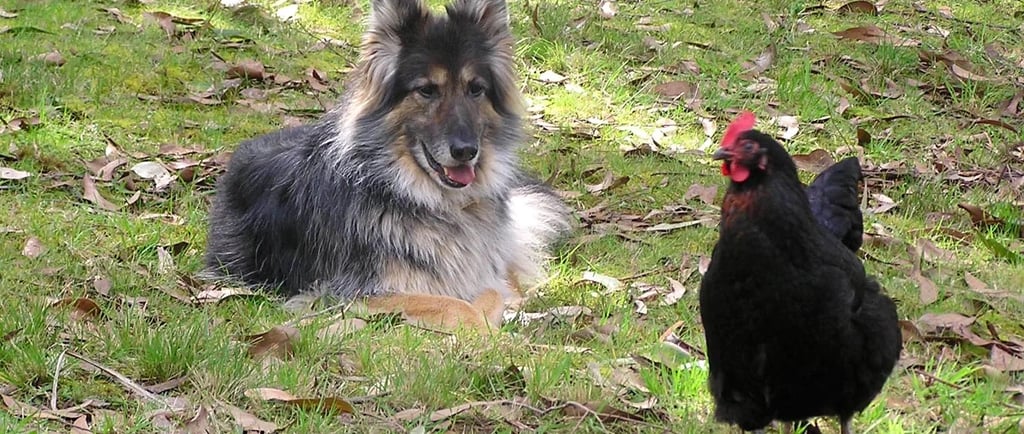Why Chickens are so Great
Chickens are great self-sufficient backyard pets. As long as they have a dry, clean, draught-free hen house to sleep in, a secure yard to roam and fresh water available they should be happy living in your backyard.
KEEPING CHICKENS
4/12/20234 min read



Why Chickens are so Great!
they provide your family with food
they provide natural fertiliser for your garden
they eat insect pests, including spiders & cockroaches
they eat your families food scraps (especially things that cannot be composted)
Chickens are great self-sufficient backyard pets. As long as they have a dry, clean, draught-free hen house to sleep in, a secure yard to roam and fresh water available they should be happy living in your backyard.
Feeding Your Chickens
To ensure a constant supply of deliciously nutritious eggs, feed your chickens a free-ranging grain mix with additional egg grit (medium is good). Shell grit assists with egg shell production and helps to grind up food in the gut.
Each chicken will eat approx 1kg of food each week. Most of your left over food scraps is fine for chickens, but don’t overfeed. If they don’t eat the scraps, remove and throw into your compost bin as to not attract vermin.
Chickens require lots of clean, fresh drinking water readily available at all times.
Due to the natural texture of grain mixes, chickens will tend to eat the most attractive portions first. If self feeders are used, the chickens may empty the feeder chasing the most desirable bits. To stop this messy habit, only put out as much as the chickens will eat in a day.
Chickens need access to green grass which contains natural colouring pigments will enhance egg yolk colour and produce a rich and attractive yolk.
Wasting food can be a costly problem. To help stop hens from flicking the food out of the feeder with their beak, try raising it to about head height (theirs, not yours!). There are also feeders available to help avoid this, but they are rather costly.
Chickens love to dig for bugs and eat weeds around the garden. But they’re not the tidiest of creatures – your mulch will end up on the paths!
Protein is an essential nutrient that is required by poultry for growth and egg production. A laying hens diet should contain 15-16% protein from the start of egg production. The average hen will lay 6 eggs a week, altho’ this will taper off during the midst of winter.
Housing Your Chickens
Due to a hen’s preference to roost at night it is recommended that the hen-house be fitted with perches. Nesting boxes lined with a suitable material such as soft straw should be provided so that eggs can be kept clean and dry.
Keep the hen house clean – to stop rodents and parasites from being attracted to your coop, it needs to be cleaned out thoroughly once a week. Replace straw in nest boxes regularly. Wipe down perches.
Chickens need to dust bath, it gets rid of lice and other bugs naturally. If you don’t have a dusty patch in your yard, try a childs plastic sandpit shell filled with fine dirt and sand.
Let your chickens out of their coop to scratch and dust bath. Afternoons are best as they will often lay in the mornings. It also makes it easier to get them to return to their roost in the coop upon dusk.
Chickens don’t like being chased. The best time to handle a chicken is once its roosted for the night. If you need to catch one during the day, approach slowly and often she will crouch down in anticipation. Gently pick her up using both hands, keeping the wings firmly held.
Chickens need safe place to retreat to if they’re feeling stressed. We make little cubby houses in the aviaries using hay bales, to provide a cool, dark place to recover in if need be. More often than not they will make this ‘home’ when raising their chicks.
Important Needs for your Chickens:
• Protection from the elements and a comfortable environment are important for overall health and egg production.
• Coops need to be kept dry. Place in a shady spot during the hot summer days, keep away from damp areas during winter.
• Food storage – Chicken food and egg grit should be stored in vermin-proof containers. Galvanised rubbish bins or small wheelie type bins are fine.
Healthy Chickens are Happy Chickens
Parasite, lice and fleas can all be irritating to chickens. Prevention is the key to avoiding dealing with a sick chook. There are many options available, including natural alternatives. If you suspect there is a problem (ie looking off-colour and/or not laying) flip the chicken over and have a look at its underside. Chickens will stop laying if they are being hassled by pests.
Moulting & Egg Production
Laying hens have a natural response to day length affecting the number of eggs laid. During autumn and early winter, when days are getting shorter, hens will tend to lay fewer eggs or may stop laying altogether and go into a moult.
A moult is a naturally occurring cycle that all hens go through a number of times during their life. During a moult a hen will stop laying, shed a large amount of its old feathers and replace them with new feathers. When the moult has finished the hen will start a new cycle of lay. This is why egg production is normally greater during spring.
Broody Chickens
We believe nature knows best, so we wait until our wonderful clucky mothers tell us its time to go broody. This is usually from Oct/Nov onwards, meaning that pullets will be available early in the new year. Believe us when we say its worth the wait, our girls make the best backyard buddies.
Can chickens & dogs co-habit in a backyard?
Yes! Ours do. But of course, it will depend upon your dog. All terriers (staffies, foxies etc) are a risk as they are bred to catch and kill prey. That being said, most dogs can be trained. All interactions between a new and existing pet should always be supervised regardless of breed or species. Setting up a hen run that the dog can’t access is a good way to start the introduction process.
Chooks are surprisingly low maintenance pets that provide not only eggs, but hours of joy for kids and adults alike.
Keeping chickens in the backyard has lots of benefits and done properly, will reward you and your garden in many ways for years to come.
You May Also Like


PAW PRINTZ - Caring for Companion Animals since 2001
PO Box 467, Monbulk VIC 3793
Paw Printz © 2026
